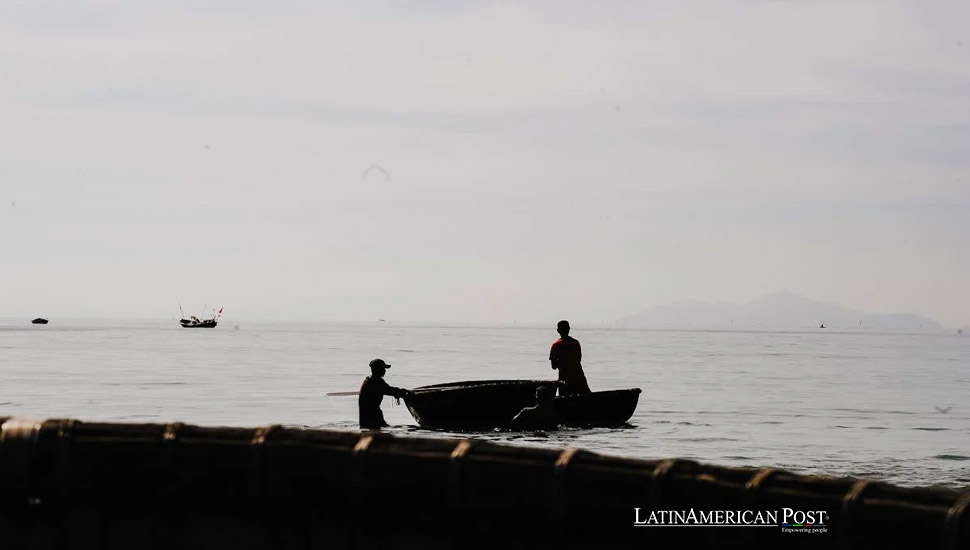Brazilian Fishermen Use Mobile App to Fight Environmental Destruction

As pollution continues to devastate Rio de Janeiro’s iconic Guanabara Bay, Brazilian fishermen are taking the fight into their own hands with a new mobile app designed to expose environmental crimes, the AFP reported. Developed with the help of NGO 350.org, the app has quickly become a crucial tool in the ongoing battle to preserve the bay’s waters and the livelihoods dependent on them.
Brazilian fishermen have long fought against the pollution that threatens to destroy Guanabara Bay, one of Rio de Janeiro’s most iconic natural features. Faced with seemingly insurmountable odds, these fishermen, with the help of a new mobile app, are now turning to technology to expose environmental crimes in their waters. This app, developed with the assistance of the environmental NGO 350.org, allows fishermen to document and report spills and other forms of pollution that plague their fishing grounds.
Alexandre Anderson, a well-known Brazilian activist and fisherman, knows all too well the challenges of fighting pollution in Guanabara Bay. As he steers his boat through the bay’s polluted waters, Anderson uses his phone to capture a video of an oil spill spreading across the surface. It’s a scene he has witnessed countless times, but now, he has a powerful new tool. Thanks to the app developed by 350.org, Anderson can upload his video, complete with precise geolocation data, to a website dedicated to exposing environmental violations.
“We used to take pictures with our cell phone or a camera,” Anderson told AFP during one of his patrols in the bay. However, without accurate data, these images were often dismissed by authorities. “The app gives me the precise data to file a complaint anonymously,” he explained.
A moderator first verifies the app’s information and then publishes it on a dedicated website. From there, it is reported to relevant authorities, such as Brazil’s environmental regulator, Ibama, or the country’s navy, which has jurisdiction over the bay. Within just three weeks of the app’s launch on July 26, more than 20 complaints had been posted on the website, with over 100 more under review.
A Natural Wonder Under Siege
Guanabara Bay, a natural port covering approximately 400 square kilometers (154 square miles), has long been a vital resource for Rio de Janeiro. Its waters are crucial for tourism and fishing, yet pollution constantly threatens them. The bay is frequently contaminated by oil spills, chemical runoff, untreated wastewater, and abandoned old ships.
Despite these challenges, local fishermen have continued to work in the bay, though the catch is often disappointing. Fishermen like Roberto Marques Resende, who has spent decades fishing in these waters, remember when the bay teemed with life. But all that changed after a catastrophic oil spill in 2000, which saw 1.3 million liters of oil released into the bay from a Petrobras refinery. “That ended the fishing,” Resende told AFP. “You practically don’t find any sea bass or hake anymore.”
The impact on the local fishing industry has been devastating. The fish that once thrived in the bay’s waters have become increasingly scarce, forcing fishermen to accept the meager catches or abandon their livelihoods altogether. For many, the struggle to protect the bay has become a fight for survival.
The Power of Technology in Holding Polluters Accountable
The introduction of the new mobile app represents a significant shift in the power dynamics of this struggle. In the past, fishermen like Anderson and Resende could document the pollution they encountered, but authorities often dismissed their evidence due to a lack of precise data. Now, with the app’s ability to provide accurate geolocation and time-stamped proof, it has become much more complicated for officials to ignore the complaints.
“The inspection agencies always claimed they don’t have the tools to deal with complaints,” said Paulo Barone, a member of another local fishermen’s association. But with this new app, he believes that excuse is no longer valid. “The authorities can no longer deny or ignore the complaints.”
For 350. org’s Brazil coordinator, Luiz Afonso Rosario, the app is a crucial tool for the fishermen, who have been on the “front lines” of the fight against pollution for far too long. “Oil and gas companies, in addition to polluting the waters that are a source of food, income, and leisure for thousands of families, aggravate the climate crisis… by providing fossil fuels that are the main cause of global warming,” Rosario told AFP.
A Struggle for Justice and Preservation
For some fishermen, the battle is about preserving their livelihoods and seeking justice for the environmental damage inflicted on the bay. Anderson, an outspoken critic of the petrochemical industry for years, has faced threats and attacks due to his activism. He hopes that the app will help bring those responsible for the pollution to justice.
“Those responsible need to be punished,” Anderson said. “Only then will we solve these problems.”
The app’s development and the fishermen’s determination underscore the lengths these communities are willing to go to protect Guanabara Bay. Their struggle highlights the broader issues of environmental justice and the fight against powerful interests that continue to exploit natural resources without regard for the consequences.
The fishermen’s efforts have not gone unnoticed. Their use of technology to combat pollution has drawn attention to the ongoing environmental crisis in Guanabara Bay, and it serves as an example of how grassroots activism can leverage modern tools to hold polluters accountable.
A Model for Environmental Activism
The story of Guanabara Bay’s fishermen is one of resilience, innovation, and determination. Faced with an environmental disaster that threatens their livelihoods and the future of their community, these fishermen have turned to technology to fight back. With the help of the new mobile app developed by 350.org, they are documenting and exposing the pollution that plagues their waters, forcing authorities to take action.
Also read: Brazil Tackles Credit Card Debt with New Interest Rate Caps
As the app continues to gain traction, it could serve as a model for other communities facing similar challenges worldwide. The fishermen of Guanabara Bay have shown that, even in the face of overwhelming odds, it is possible to make a difference. Their story is a powerful reminder that the fight for environmental justice is far from over—and that with the right tools, it can be won.





